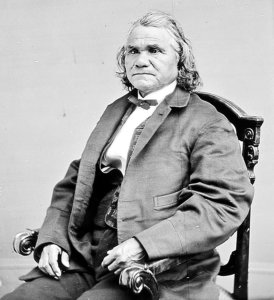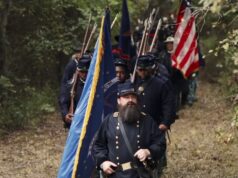
Around the time I was pleased to hear the words “Indian removal” appearing in former state Rep. Lisa Billy’s latest Chickasaw Nation commercials, the Oklahoma City Public Schools board voted to change the names of three elementary schools because they were labeled in honor of people connected to the Confederate States of America. One of those whose name will be eradicated from an elementary edifice is Stand Watie (1806-1871), a Confederate general and a prominent Cherokee leader.
Georgia-born Watie was one of the men who signed the 1836 treaty wherein Cherokees traded some of their land in the Southeast for land in Indian Territory. That launched something of a civil war within the tribe, and it provided for a different trek to the territory than other tribes faced.
The Cherokees — like the Choctaws, Chickasaws, Creeks and Seminoles — were slave owners; when the Civil War began, they all signed treaties with the Confederacy. Even a couple of decades after Indian Removal began, the five tribes remembered the color of the uniforms worn by the troops who marched them to Indian Territory, and the stars and stripes on the flag that flapped over the forts housing those troops. Their alliance with the Confederacy was a natural one.
In 1861, Watie was commissioned as a colonel in the rebel army. By the end of the war, he was a brigadier general and the last Confederate general to surrender.
Known for the effectiveness of his guerrilla tactics, Watie’s military career is a perfect example of the Confederacy’s lack of coordination. He was left in Indian Territory – where the Civil War had quickly become a stalemate – instead of being located in the Shenandoah Valley or in Pennsylvania, where he might have done the Confederacy some strategic good.
After the war, Watie spent two years in exile with the Choctaws before returning to Cherokee land and building a home. He died four years later.
Politically incorrect? Stand Watie vs. Will Rogers
Watie is a fixture in Oklahoma history texts. Should he be edited out of them on grounds of political correctness?

Will Rogers is in those same textbooks. Perhaps his name should be expunged from airports, schools and everywhere else in Oklahoma for the same reason. In the wake of the Tulsa Race Riot in 1921, Rogers wrote (on Oct. 22, 1922) that he had nothing to say about the Ku Klux Klan in Oklahoma because he lived “down there” and knew “a lot of those Birds. ‘Rest in Peace’ covers many a man’s head down there who spoke out of his turn.”
And then he added, “I ain’t going to tell some people 2,000 miles away how they should conduct their business.” That was because he had “common sense.”
Will’s daddy, Clem Rogers, had been a captain under Stand Watie’s command in the Civil War; if it is a matter of guilt by association or familial relation, then take down both names. No Watie, no Rogers. Then you won’t have to divide the laurels between military service and common sense — or between one Cherokee and another.
Yes, history is messy stuff, isn’t it?





















